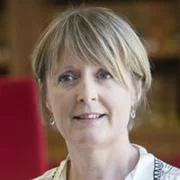Taking the pressure off: giving women time to start a family

Contents
The number of women opting to freeze their eggs is rising year on year. Many are waiting for the right partner to come along, or the right time in their career to start a family. And while there are no guarantees, the younger you are when you freeze your eggs, the more likely you are to be able to successfully use them in any future IVF treatment if you can’t conceive naturally. "Social" egg freezing is now so popular that some companies offer it as a workplace perk, along with gym membership and private health insurance.
Until recently, UK legislation meant that those eggs usually had to be destroyed after 10 years. So, if at 25 a woman froze her eggs, she would have to use them by the time she was 35. Research by Emily Jackson, Professor of Law at LSE, has been instrumental in helping to change the legislation on this, to allow women to store their eggs for much longer.

For many women, the 10-year limit has been incredibly distressing.
Making sure all patients are treated equally: changing the law to give women more time
Last year, the UK government announced that the 10-year limit on storing frozen eggs, sperm and embryos will be scrapped and replaced by storage periods that can be renewed every 10 years up to a maximum of 55 years. Announcing the decision, Health Secretary Sajid Javid said: "The current storage arrangements can be severely restrictive for those making the important decision about when to start a family, and this new legislation will help turn off the ticking clock in the back of people's minds."
The proposed legislation will do away with a distinction between those who are and are not "prematurely infertile" – who are already allowed 55 years - and treat all patients equally.
Professor Jackson said: "For many women, the 10-year limit has been incredibly distressing, and it was also pointless as there was no health reason for it, so it was an anomaly that needed to be fixed. I wrote a journal article in 2016 saying that this was absurd and plainly interfered with women’s rights to respect for their private and family life. There was a campaign to extend the limit and happily, after considerable pressure, the government have realised that this needs to be cleared up and the law is going to be changed. The government is currently consulting on exactly how the new rules are going to work in practice."

A fake beauty product with a very important message
Part of Professor Jackson’s work on egg freezing involved an innovative collaboration with a creative agency called The Liminal Space to educate and engage the public about fertility and elective egg freezing. They created a pop-up "shop" at London’s Old Street Station which looked like a typical high-end beauty store, a Space NK or a Jo Malone, with assistants standing behind displays of a stylish new product range of "face creams", "perfumes" and "serums" called "Timeless".
Professor Jackson explained: "It wasn’t selling anything. It was all about educating the public. For example, there was a display made up of test tubes filled with red liquid, labelled with numbers from 12 to 50 – the average span of female fertility. The liquid represented the number of eggs that a woman would have in her ovaries. So obviously at 12 the test tubes were quite full, but at 50 they were empty.
"But I think what was visually striking was that you could see that by women’s 30s, the red liquid was already quite low and declining, before dwindling still further in their 40s. Men who came into the shop out of curiosity were often quite surprised by this arresting visual representation of women’s age-related fertility loss."
Other products featured information about the pros and cons of egg freezing. Even if a woman decides to have her eggs frozen, there is no guarantee that a future IVF cycle using her frozen eggs will result in a baby.
Encouraging the public to think about fertility loss
We were concerned that women were opting for egg freezing – an expensive and invasive process with no guarantee of a successful outcome– without knowing all the facts.
Professor Jackson said: "We were concerned that women were opting for egg freezing – an expensive and invasive process with no guarantee of a successful outcome – without knowing all the facts. We wanted to encourage women and men to think about fertility loss and the implications of egg freezing. It certainly should not be oversold to women as a guaranteed way to preserve their fertility indefinitely."
These ethical considerations were explored by Professor Jackson in another journal article in 2018.
One of the most popular "products" was the "Eau So Pressured" perfume range, with names like "Promotion or Procreation", "Mr Wrong" and "Mr Right not Mr Ready". Amanda Gore of The Liminal Space, the design consultancy which proposed the idea of a fictional beauty brand, said: "The product ranges were designed to help people access the information easily. We wanted the perfumes to bring a level of humour and then deepen the engagement through the facts each one detailed. It seemed to work, as many stayed in the shop for up to half an hour, which is far longer than we expected."
For a project designed to engage with the public, there is impressive data to prove that it achieved its aim. In the six days that it was open, 1,200 people visited the shop, which also featured a programme of talks and debates hosted by Professor Jackson and Professor Anne Phillips of LSE’s Gender Institute and Department of Government, and a further 5,000 visited the shop’s website. It also attracted media coverage across print, online, television and radio, was viewed online by 335,000 people and shared over 2,500 times on social media. The collective reach of the print media was over 800,000, the combined TV and print reach was 11.8 million and the radio reach was 4.2 million listeners.
Since 2018, Professor Jackson has worked closely with Baroness Ruth Deech, former Chair of the Human Fertilisation and Embryology Authority, and the Progress Educational Trust, to successfully campaign for a change of legislation on this issue.
Professor Emily Jackson was speaking to Joanna Bale, Acting Head of Media Relations at LSE.
Banner image credit Rosalie Schweiker.
Find The Liminal Space online at www.the-liminal-space.com, or follow them on Twitter @TheLiminalSpace
Download a PDF version of this article




